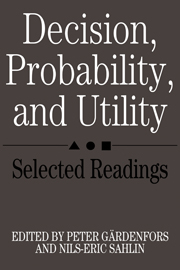Book contents
- Frontmatter
- Contents
- List of contributors
- Preface
- 1 Introduction: Bayesian decision theory – foundations and problems
- Part I Foundations of Bayesian decision theory
- 2 Truth and probability
- 3 Individual decision making under uncertainty
- 4 The sure-thing principle
- 5 Probable knowledge
- Part II Conceptualization of probability and utility
- Part III Questionable rules of rationality
- Part IV Unreliable probabilities
- Part V Causal decision theory
- References
- Name index
- Subject index
2 - Truth and probability
Published online by Cambridge University Press: 05 June 2012
- Frontmatter
- Contents
- List of contributors
- Preface
- 1 Introduction: Bayesian decision theory – foundations and problems
- Part I Foundations of Bayesian decision theory
- 2 Truth and probability
- 3 Individual decision making under uncertainty
- 4 The sure-thing principle
- 5 Probable knowledge
- Part II Conceptualization of probability and utility
- Part III Questionable rules of rationality
- Part IV Unreliable probabilities
- Part V Causal decision theory
- References
- Name index
- Subject index
Summary
To say of what is that it is not, or of what is not that it is, is false, while to say of what is that it is and of what is not that it is not is true.
—Aristotle.When several hypotheses are presented to our mind which we believe to be mutually exclusive and exhaustive, but about which we know nothing further, we distribute our belief equally among them.… This being admitted as an account of the way in which we actually do distribute our belief in simple cases, the whole of the subsequent theory follows as a deduction of the way in which we must distribute it in complex cases if we would be consistent.
—W. F. Donkin.The object of reasoning is to find out, from the consideration of what we already know, something else which we do not know. Consequently, reasoning is good if it be such as to give a true conclusion from true premises, and not otherwise.
—C. S. Peirce.Truth can never be told so as to be understood, and not be believed.
—W. Blake.Foreword
In this essay the Theory of Probability is taken as a branch of logic, the logic of partial belief and inconclusive argument; but there is no intention of implying that this is the only or even the most important aspect of the subject.
- Type
- Chapter
- Information
- Decision, Probability and UtilitySelected Readings, pp. 19 - 47Publisher: Cambridge University PressPrint publication year: 1988
- 9
- Cited by



